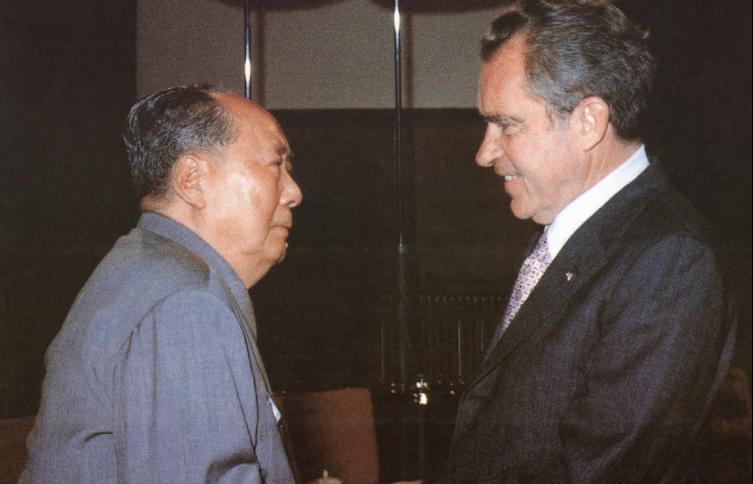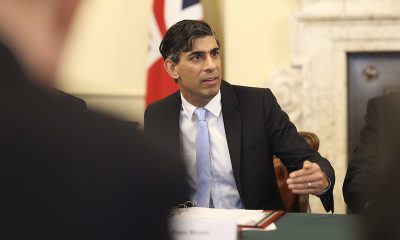News
Donald Trump and the ‘madman theory’ of foreign policy

Former President Donald Trump. (File Photo: Gage Skidmore/Flickr, CC BY-SA 2.0)
With Donald Trump now looking more and more likely to be the Republican nominee for November’s presidential election, the former president is now making the case that among other things, he would be much more effective than the incumbent, Joe Biden, in areas such as foreign policy. For Trump’s supporters it is his unpredictable and risky nature that has led to some of his biggest foreign policy successes. To his detractors he comes across as dangerous and unpredictable.
Trump certainly has leaned in to the “madman theory” of foreign policy – the idea that an unpredictable and irrational leader would have an advantage in international bargaining. But has Trump’s impulsiveness really been effective – or has it been destabilising?
This is not the first time that the madman theory of foreign policy has been applied to a US leader. Though the theory was first articulated by Daniel Ellsberg in 1959, the phrase “madman” was popularised from statements made by former US president Richard Nixon. Nixon reportedly claimed that he wanted his adversaries to think that he was so obsessed with communism that he could not be restrained – and would even be crazy enough to start a nuclear war, forcing his enemies to beg for peace.
But while Nixon carefully crafted this image, it is not clear that Trump’s madman tendencies are part of a similar master plan.
Madman theory assumes that making seemingly unbelievable threats – such as embarking on nuclear war – are more credible if they are coming from someone who is unpredictable and possibly unstable. This idea flies in the face of traditional neo-realist theories of international relations that assume that people are rational and consider the consequences of their decisions. This explains the logic of nuclear deterrence, when there is mutually assured destruction – meaning that logical decision makers would never go as far as using their nuclear arsenal.
Instead, madmen supposedly don’t consider the consequences of their actions – which should, in theory, instil fear in their enemies.
Tool for dictators
But who are these madmen? Do leaders actually behave this way, and if so have they had any success? Studies of authoritarian regimes have noted that certain types of dictatorships – namely personalist dictatorships, where power is vested in one person – are more likely to fit the madman stereotype.
But personalist dictators are also most likely to back down after making threats, such as when Idi Amin threatened to annex western Kenya in 1976, only to back down after Kenyan president, Jomo Kenyatta, threatened to block Uganda’s imports. Most of these “madmen” are often just full of hot air or their military intelligence is so poor (both inflating their capacities and downplaying their adversaries) that they feel emboldened to engage in risky behaviour that they can’t back up.
In Trump’s case, he led a country with tremendous military power, but rather than being strategic and calculated like Nixon, he has been described as impulsive, ad hoc and incompetent.


These traits have certainly affected Trump’s foreign policy, but this mostly has resulted in reckless decisions. The list is long: quitting the Paris Climate Accords, dismantling the Iran-nuclear deal, withdrawing from the UN Human Rights Council, threatening to withdraw from Nato and the World Health Organization and engaging in a bizarre back and forth with North Korean dictator Kim Jong Un, which resulted in a series of “love letters” between the two.
Madmen rarely prevail
There is not only little evidence that Trump’s exploits have been effective, but also few examples of madman tactics actually working with other leaders. Idi Amin had little success with his provocations with Tanzania in 1978-1979. Nor did Muammar Gaddafi after he tried to annex the Aouzou Strip, in northern Chad in 1980.
Research has pointed to several reasons for why madmen are often unsuccessful. For a start it’s never clear if the other people involved actually understand what the “madman” is intending to signal. And even if that is obvious, because the “madman” is deemed crazy their threats are rarely taken seriously.
In Trump’s case it is also not clear if being perceived as “mad” is something to be feared or ridiculed. His unpredictability mostly played out on the world stage through a series of strange exchanges with autocrats – such as fawning over Vladmir Putin in Helsinki in 2018, where he took the word of the Russian president over his own intelligence agencies. Trump also allegedly threatened to kill Syrian president, Bashar al-Assad in 2017, but then decided to pull US troops out of Syria in December of 2018.
And Trump’s antics with Iran – pulling out of the nuclear deal and threatening to bomb Iranian cultural heritage sites – seemed to do little to deter the Islamic Republic’s nuclear ambitions. In fact, hardliners were then elected in the 2021 elections, which would have been the last thing US foreign policy planners wanted.
Prior to Trump and Kim Jong Un’s “love affair,” Trump engaged in reckless threats to destroy North Korea (and was himself the recipient of insults from the opposing leader who referred to Trump as “mentally deranged”. Though Trump boasted that his summit with North Korea is one of his foreign policy wins, he accomplished no more than any past presidents and Kim Jong-un remains as much a danger to regional stability as ever.
In spite of this, Trump has embraced the madman theory. But not only does appearing mad provide limited advantages in negotiating, it actually erodes a leader’s credibility and undermines their nation’s long term foreign policy interests. Madmen theory isn’t really strategic – it’s just idiotic.![]()
![]()
Natasha Lindstaedt, Professor, Department of Government, University of Essex
This article is republished from The Conversation under a Creative Commons license. Read the original article.





















